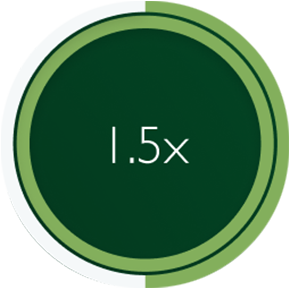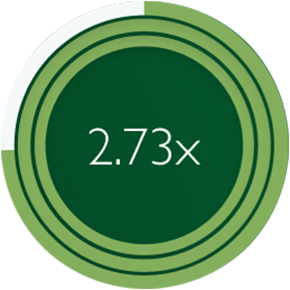Maximize Your Retirement Income
Looking out over the next 10-15 years 8
70%
of Canadians are worried about their retirement strategy
Main Concerns
When thinking about their retirement income plan, investors are most concerned about:

Now more than ever, Canadians need expert advice on how to make the most of their retirement income.
Other Factors Influencing Your Retirement Strategy
Timing of Withdrawals
Withdrawals made during market downturns could erode your savings faster than anticipated.
Historically Low Rates
Now more than ever, Canadians need expert advice on how to make the most of their retirement income.

Pension Rules
The rules for CPP and OAS could mean working past age 65.

A Sudden Life Event
Divorce, dealing with aging parents, sudden illness or disability can alter your income needs.
How much will you need?
How you fare financially and how much you will need in retirement depends on various factors.
Make the most of your retirement savings
Working with an advisor, consider all your sources of income and design a plan that allows you to maximize your income from each source in the most effective and tax-efficient way possible.
Private Pension
Only 37.1% of Canadians belong to a pension plan1, and those plans are being scaled back as employers reduce costs. In most cases, you will need retirement income beyond your private pension.
RRSPs/RRIFs
Registered Retirement Savings Plan (RRSPs), which must be converted to Registered Retirement Income Funds (RRIFs) in the year you turn 71, are an important tool for retirement income, yet only 5.9 million Canadians contributed to an RRSP in 2019.4 Be sure you are maximizing your savings through this tax deferral strategy.
Non-Registered Savings
Many people also use savings accounts, GICs, term deposits, mutual funds and other savings to support their retirement income.
CPP/OAS
The federal government has made changes to the Canada Pension Plan (CPP) and Old Age Security (OAS) with significant implications for Canada’s retirees. CPP changes include increased contribution rates for employees and employers, resulting in increased benefits for future retirees.2 However, studies show that government-provided benefits will not be enough to cover basic everyday expenses.3
TFSAs
Tax-Free Savings Accounts (TFSAs) are another good way to set aside tax-free retirement savings while you are working. Canadian tax filers are missing a good opportunity to save for retirement with an average of $34,165 per person in unused TFSA contribution room in 2018.5
Inheritance
According to Angus Reid only about 5% of Canadians expect to derive some income from an inheritance.7 Depending on your circumstances, counting on an inheritance alone may be risky.
Home Equity
Your home equity can be a part of your retirement income; however, it likely won’t be enough on its own to fund retirement and may have other planning implications. Even in combination with government-provided benefits, you may need other sources of income.6
When you move from accumulating wealth to drawing income from your portfolios, your investment objectives and strategy will evolve
Accumulation Phase

Paycheck

Investments

Growth

Diversification
Decumulation Phase

Investments

Distributions

Income

Safety
92%
of investors say advice has a positive impact on achieving their life goals 8
The Right Advice
With comprehensive analysis and experience, we can help you plan for the retirement lifestyle you want and maximize your income – with the right combination of investment and risk management strategies – aligned to your goals and appetite for risk.
The Value of Advice

0
No Advice

4-6
Years of Advice

7-14
Years of Advice

15+
Years of Advice
Your retirement is too important to leave to chance
As you transition to the decumulation stage of your financial life, look to an advisor for professional advice on how to maximize your retirement income with more confidence.
1. Statistics Canada: Pension Plans in Canada, as of January 1, 2020.
2. http://www.moneysense.ca/news/details-of-increased-cpp-premiums-released/
3. Canadian Institute of Actuaries: Planning for Retirement: Are Canadians Saving Enough?
4. Statistics Canada: Tax-Free Savings Account statistics (2018 tax year)
5. Canada Revenue Agency: Tax-Free Savings Account statistics (2018 tax year).
6. Canadian Institute of Actuaries: Planning for Retirement: Are Canadians Saving Enough?
7. Angus Reid Institute: Retirement in Canada: Lots to Enjoy About ‘Golden Years’ but Financial Worries Loom Large – Especially for Those Still Working, Angus Reid Institute, July 2015
8. Investment Planning Counsel, in partnership with Environics Research. Survey of 1001 Canadians with more than $100,000 in investable assets, August 2021.
9. More on the Value of Financial Advisors, by Claude Montmarquette and Alexandre Homme, CIRANO 2020
Commissions, trailing commissions, management fees and expenses all maybe associated with mutual fund investments. Please read the prospectus before investing. Mutual funds are not guaranteed, their values change frequently and past performance may not be repeated.
HEAD OFFICE
5015 Spectrum Way, Suite 200
Mississauga, ON
L4W 0E4
Local: 905-212-9799
Toll Free: 1-877-212-9799
Email: [email protected]
Investment Planning Counsel











